#an editor who is considerate and inclusive should not use those things against a piece's worth
Text
actually making my tags from my last post into their own post. writers who struggle with grammar, spelling, typos, errors etc i love you. writers who struggle with rereading their stuff thoroughly no matter how much they try, who don't always have access to other people to help them read i love you. whilst reading through and checking for these things is good practice i really believe that the weight of it should not be put wholly on the writer's shoulders. especially writers who are neurodivergent, disabled, have any condition that can impede their reading + comprehension, are overworked and overtired, are not writing in their native language, list goes on....because grammar mistakes/language mistakes/typos have nothing to do with your abilities as a creative. this is where editors should be uplifting writers, helping them, not scrutinising them for something they cannot always control
#and in case anyone is going to say it...like i said in my tags i get that it can be frustrating#if it feels like a piece has NOT been reread or checked for these things at all#but even then its like...do you know the writers context? their background?#does the story itself still hold up strong creatively?#im just saying some leniency and grace goes far and esp in the short story/litmag scene i think#an editor who is considerate and inclusive should not use those things against a piece's worth#for me its like....1) the word spelling and grammar check is really confusing to work with sometimes#and also just. straight up does not work sometimes#and 2) no matter how much i reread and check for spelling and grammar i will forget a word. i will misuse a word. i will forget things#a bitch is forgetful! a bitch struggles with rereading their pieces and i do what i can to help that#but i need help and grace from the editors who wish to work with me!#i remember one time i wrote vacancy as vanacy in an excerpt in a writing update#literally passed me by and i was so humiliated?? nobody even pointed it out#but i assumed people were going to think of me less that i would make a simple mistake#its just...v hard and daunting being open with your writing sometimes lol lets all be kind to each other
45 notes
·
View notes
Photo
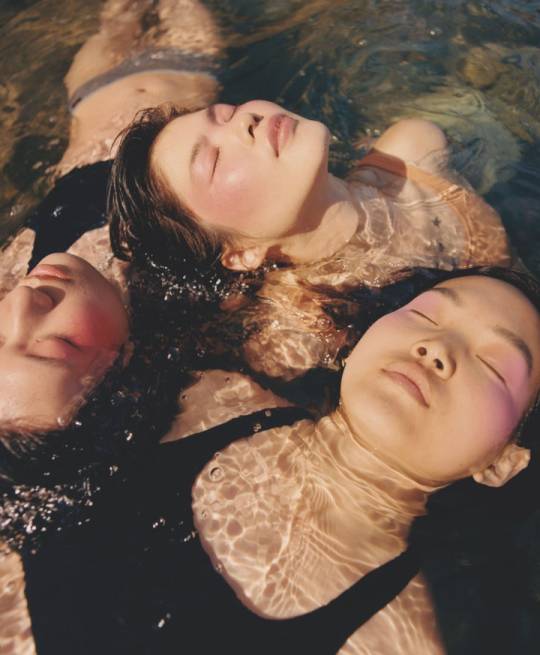
C/O Berlin Magazine | It’s a space for everyone, and everyone can come in — Thoughts for the future
“I cringe when I hear words like ‘diversity’ and ‘inclusion.” To quote the civil rights activist, philosopher, and writer Angela Davis, “diversity” and “inclusion” are terms that you, dear reader, might have also stumbled across in recent months, whether you wanted to or not. Inspired by global Black Lives Matter protests, mainstream media, corporations, and other institutions finally realized – in some cases as it seems overnight – that racism is also an intractable problem in Germany. Unfortunately, we need more than just hollow words and empty promises to solve this problem. You might be thinking to yourself: “But didn’t people take to the streets or write opinion pieces in newspapers to protest structural racism? And didn’t major institutions promise to offer diversity and inclusion workshops in discussion after discussion on television?” Perhaps, but don’t be fooled. Instead of critically questioning the role that white decision-makers play in perpetuating systemic racism, “society” was blamed. Over and over again, Black* people were asked to answer if they had really experienced racism through scrutiny of their real-life stories, while predominantly white “experts” were invited onto talk shows to discuss the so-called “racism debate”. Profound, structural changes are still lacking, at least as of the time this text goes to print.
Presence equals power. This brings us to the current moment where you are reading these words about British photographer Nadine Ijewere’s solo show at C/O Berlin. Nadine Ijewere is the first Black woman to be given a space that has previously been occupied almost exclusively by white men. As such, this exhibition is significant not only for Black photographers, but for everyone more used to being treated as the object than the artist or curator in spaces like this where many people don’t feel welcome or simply don’t exist. As trivial as it may sound, visibility comes from being able to hang pictures on a wall—or write these lines.
Joy as an act of resistance. Nadine Ijewere belongs to a generation of artists and creatives who have realized that there are more options than simply following the traditional path. Knowing that society has long since changed—even if many gatekeepers in fashion, art, and the media still cling to the status quo—this DIY generation is creating its own platforms to elevate their own role models with an army of loyal followers. In their work, representatives of this generation create worlds that rarely center Eurocentric beauty norms. The same goes for this young British artist, whose work shows people in all their beauty and uniqueness. Her photographs regularly appear on the pages of British, American and Italian Vogue, i-D, or Garage, and she has collaborated with brands such as Nina Ricci and Stella McCartney. Ijewere proves that beauty is multifaceted and that fashion is fun and for everyone.
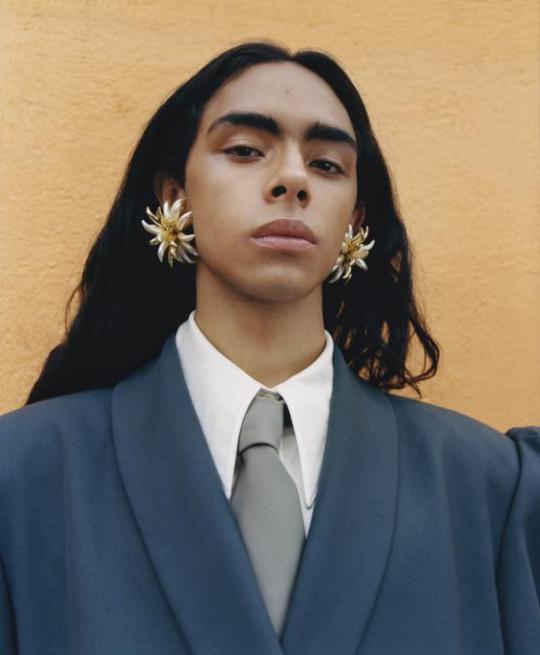
More than a seat at the table. When artists like Ijewere make it to the top, it’s not because of nepotism, tokenism, or diversity as a trend, but despite all the obstacles that have been put in their way. And instead of assimilating after being accepted by the old guard, they continue to write their own rules. In Ijewere’s case, this means not only working with diverse models and teams, but also passing her knowledge on as a mentor to keep the proverbial door open. She’s less driven by the desire to stand out from the mainstream than she is to give back by inspiring younger generations, who are able to see themselves in magazines. “Within the time I have, I’ll use every opportunity I get and every space I can get into to expand the horizon of others.”
Representation matters. Celebrating Black people and people of color in a traditionally white space was also the goal of “Visibility is key – #RepresentationMatters,” a watershed moment for the German lifestyle magazine industry when it launched on vogue.de in spring 2019. The goal was to take first steps toward a forward-thinking future where inclusion and diversity would no longer be mere buzzwords, but lived practices. Part of that effort meant ensuring representation in front of as well as behind the camera. The results weren’t perfect and they might not have led to social change, but we proved that there isn’t a lack of creative talent among Black and Brown people in Germany. If anything, we proved that these talents are often denied the space to develop their full potential.
Ideas for the future. As you see, dear reader, it takes teamwork to bring about long-term change, and for the first time the doors are open a bit. Nadine Ijewere's exhibition shows this, as does being able to write these very words in the C/O Berlin Newspaper. In the statements below, we asked German and international artists and creatives to envision a future where representation and inclusion are lived practices instead of rare exceptions. The results are ideas for a future that is reachable—as long as we all keep working towards it every day. Together.
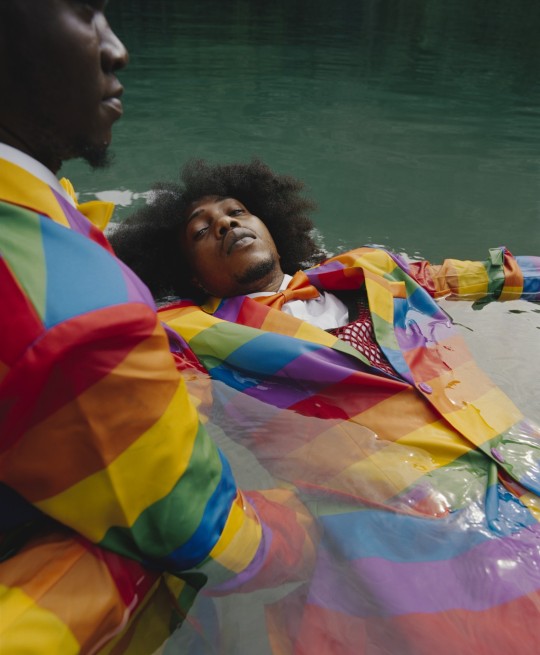
Nadine Ijewere, artist
Art is about art. It’s not about you personally. That’s why artists need to be seen as artists. We all get stereotyped and put into the same box—but we have our own identity. We are put into the same space just because we are Black, but we are all very different people.
Edward Enninful, OBE, Editor-in-Chief of British Vogue
Nadine is one of the leading fashion photographers of her generation. She’s not only inherently British in her work, she’s also Black British. She really understands the complex mix of culture, fashion, beauty, and the inner working of a woman, so when you see her images, it’s never just a photograph. There’s also a story and a narrative behind it.
Benjamin Alexander Huseby & Serhat Işık, designers for the label GmbH
Our work has always been about wanting to show our community and culture to tell our stories as authentically as we can. It was never about “diversity”, but about being seen. We want to create a world where not only exceptional Black and Brown talents no longer have to be truly exceptional to get recognition for their work, a world where we no longer are the only non-white person in the room because we built the motherfucking house ourselves.
Mohamed Amjahid, freelance journalist and author, whose book Der weiße Fleck will be published by Piper Verlag on March 1, 2021.
It's time that Black women become bosses. Gay Arabs should get to call the shots. Refugees belong on the executive boards of big corporations. Children of so-called “guest workers” should move into management positions too. People with disabilities should not just have a say, they should make the decisions. Vulnerable groups deserve to put their talents and ideas to work in the service of the whole society. Not every person of color is automatically a good leader by virtue of their background, but all-white, cis-male executive boards are certainly incapable of making decisions that are right for everyone. That’s why we need more representation at the very top, where the decisions are made.
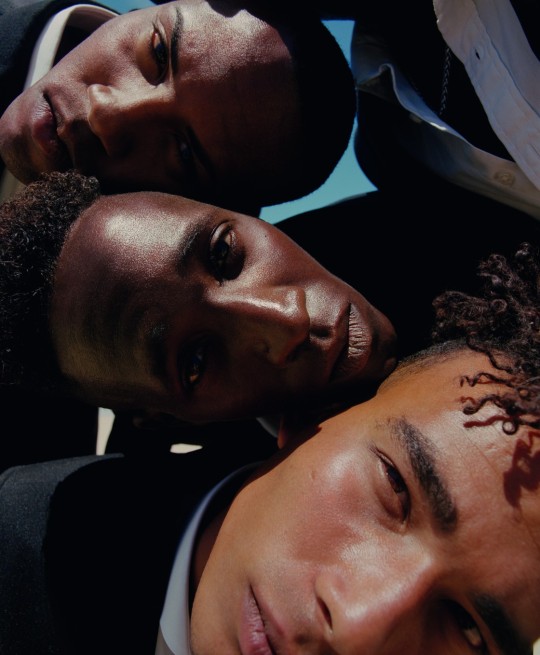
Melisa Karakuş, founder of renk., the first German-Turkish magazine
For a better future, I demand that we educate our children to be anti-racist and to resist when others or when they themselves are subjected to racism. I demand that discrimination is understood through the lens of intersectionality and solidarity! I demand that even those who are not affected by racism stand up against it! This fight is not one that we as Black people and people of color fight alone—for a better future, we all have to work together.
Tarik Tesfu, host of shows including the NDR talk show deep und deutlich
When I look in the mirror, I see someone who grew up in the Ruhr region and loves currywurst with French fries as much as Whitney Houston. I see a person who has his pros and cons and who is so much more than his skin color. I see a subject. But the German media and cultural system seem to see it differently because far too often, Black people are degraded and made into objects for the reproduction of racist bullshit. I'm tired of explaining racism to Annette and Thomas because I really have better things to do (for example, my job). So get out of my light and let me shine.
Ronan Mckenzie, photographer
The future of our industry needs to be one with more consideration for those that are within it. One that isn’t shrouded in burnout and the stresses of late payments, and one that doesn’t make anyone question whether they have been booked for the quality of their work or to be tokenized for the color of their skin. The future of our industry needs to go beyond the performative Instagram posts and mean-nothing awards, to truly sharing resources and lifting up one another. Our industry needs to put its money where its mouth is when words like “support”, “community” or “diversity” slip out, instead of using buzzwords that create an illusion of championing us. How there can be so much money in this industry yet so many struggle to keep up with their rent, feed themselves, or just rest without worrying about money is truly a travesty. If this industry is to survive then we who make it what it is need to be able to thrive.
Ferda Ataman, journalist and chair of Neue deutsche Medienmacher*innen
A recent survey of the country's most important editors-in-chief revealed that many of them think diversity is good, but they don't want to do anything about it. This is based on the assumption that everyone good will succeed. Unfortunately, that’s not true. It’s not just a person’s qualifications that are decisive, but other criteria as well, such as similarity and habit (“XY fits in with us”). It's high time that all of us—everywhere—demand a serious commitment to openness and diversity. Something is seriously wrong in pure white spaces that can’t be explained by people’s professional qualifications alone. Or to put it differently: a good diversity strategy always has an anti-racist effect.
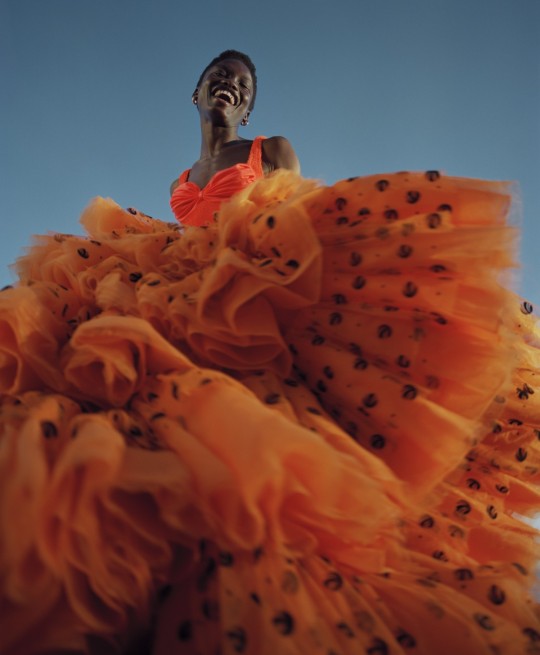
Nana Addison, founder of CURL CON and CURL Agency
Being sustainable and inclusive means thinking about all skin tones, all hair textures, and all body shapes—in the beauty industry, in marketing communications, as well as in the media landscape. These three industries work hand in hand in shaping people’s perceptions of themselves and others. It’s important to take responsibility and be proactive and progressive to ensure inclusivity.
Dogukan Nesanir, stylist
The current system is not designed to help minorities. By giving advantages to certain people and groups, it automatically deprives others of the chance to attain certain positions in the first place. That's why I don't even ask myself the question "What if?" anymore. My work is not about advancing a fake worldview, but about highlighting all the real in the good and the bad. I strongly believe that if some powerful gatekeepers gave in, if representation and diversity happened behind the scenes and we had the chance to show what the world REALLY looks like, we wouldn't be having these discussions at all. I don't just want an invitation to the table, I want to own the table and change things.
Arpana Aischa Berndt & Raquel Dukpa, editors of the catalog I See You – Thoughts on the Film “Futur drei”
In the German film and television industry, production teams and casting directors are increasingly looking for a “diverse” cast. Casting calls are almost exclusively formulated by white people who profit from telling stories of people of color and Black people by using them, but without changing their own structures in the process. Application requirements and selection processes in film schools even shut out marginalized people by denying them the opportunities that come with being in these institutions. People of color and migrants as well as Black, indigenous, Jewish, queer, and disabled people can all tell stories, too. Production companies need to understand that expertise doesn’t necessarily come with a film degree.
Vanessa Vu & Minh Thu Tran, hosts of the podcast Rice and Shine
It may be convenient to ignore entire groups, but we are and have been so much more for a very long time. We contribute to culture by making films or plays and bring new perspectives to science, politics, and journalism. We’re Olympic athletes, curators, artists, singers, dancers, and inventors. We dazzle and shine despite not always being seen. Because we have each other and we’ve created opportunities to do the things we love. We’ve created platforms for each other and built communities. Slowly but surely we are finally getting applause and recognition for the fact that we exist. That's nice. But what we really need is not just the opportunity to exist, but the opportunity to continue to grow and to stop basing our work primarily on self-exploitation. We need security, reliability, and money. That's the hard currency of recognition. That would mean being truly seen.
*Black is a political self-designation and is capitalized to indicate that being Black is about connectedness due to shared experiences of racism.
Written by: Alexandra Bondi de Antoni & Kemi Fatoba
C/O Berlin Magazine April 2021
36 notes
·
View notes
Text
Jaswinder Bolina: Poet Interview
Please join me in welcoming Jaswinder Bolina to the Poetic Asides blog!
Jaswinder Bolina
Jaswinder Bolina is an American poet and essayist. He is the author of the chapbook The Tallest Building in America (Floating Wolf Quarterly) and the full-length collections Phantom Camera (winner of the 2012 Green Rose Prize in Poetry from New Issues Press) and Carrier Wave (winner of the 2006 Colorado Prize for Poetry from the Center for Literary Publishing at Colorado State University).
His poems have appeared in numerous literary journals, been included in The Best American Poetry series, and been translated into Russian for inclusion in the Russian literary journal Polutona. His essays can be found at The Poetry Foundation, The State, Himal Southasian, The Writer, and other magazines. They have also appeared in anthologies, including the 14th edition of The Norton Reader, Language: A Reader for Writers, and Poets on Teaching.
Learn more here.
Here’s a poem I really enjoyed from his collection Phantom Camera:
If I Persisted for Seven Lifetimes, I’d Spend Six of Them with You, by Jaswinder Bolina
but something in me would
desert you
the way I lie
awake and wait for the turbine
of your breathing
to whir steady and deep
until in your sleep
I feel simple again
like myself
and reckless again
outside the road is the apparition
of a bridge deck suspended
by cones of light
from the lampposts
a drone of rotors and axles
semis about
the slow groan
of departure
but our two snifters sit
in the sink
so a prowler come
purloining might picture you
glad and drinking beside me
our toothbrushes dally
and crowd each other daily
in a cup in the bathroom
so he might wonder
at our life as trajectory
pristine and decoded
and on hearing the warp
of a floorboard
the murmur of our bodies
stirring above him
he might think to drop
deftly out of a window
with a few items to sell
or to barter
for airfare and a room
overlooking a square
so he might step out
of that room
onto his balcony
alone in a foreign light
and feel simple again
feel reckless and modern
and himself again
*****
Forget Revision, Learn How to Re-create Your Poems!
Do you find first drafts the easy part and revision kind of intimidating? If so, you’re not alone, and it’s common for writers to think the revision process is boring–but it doesn’t have to be!
In the 48-minute tutorial Re-Creating Poetry: How to Revise Poems, poets will learn how to go about re-creating their poems with the use of 7 revision filters that can help poets more effectively play with their poems after the first draft. Plus, it helps poets see how they make revision–gasp–fun!
Click to continue.
*****
What are you currently up to?
I’ve recently finished up work on my third book of poems and am sending it out to publishers in hopes someone will pick it up. Beyond that, I’m working on several essays while doing my regular teaching and reading. I’ve also gotten more deeply involved in community organizing in the aftermath of the election. It feels like a dire time in the U.S., and I’m finding it extremely difficult to ignore the political part of life right now.
Phantom Camera, by Jaswinder Bolina
I loved reading Phantom Camera. How did you go about getting this collection published?
Thank you for reading and for your generous praise! Publication has always been a bit of a mystery to me. So far, the best I’ve been able to come up with is writing the poems, eventually collecting them into a manuscript, then sending the manuscript around to university-sponsored book contests and independent literary presses. That’s what I did with Phantom Camera.
It wound up a finalist at something like 14 book contests over the course of two or so years before finally landing the Green Rose Prize from New Issues Press at Western Michigan University. For that prize and publication, I’ll be forever indebted to the poet and editor William Olsen who saw the manuscript fit to print and spent meticulous hours on line edits to tighten up the individual poems and the book as a whole considerably. Thanks, Bill!
Your first collection, Carrier Wave, won the 2006 Colorado Prize for Poetry. Was it easier getting the first or second collection of poetry published?
The first go-around, I didn’t really know what I was doing. An earlier draft of Carrier Wave had served as my MFA thesis at the University of Michigan. I continued working on it for about three years after receiving my degree, sending out various drafts to contests and open reading periods along the way. When Lyn Hejinian selected it for the Colorado Prize, it came as one of the great shocks of my life. Still, because I’d never written a book before, I suppose it felt impossible and easy all at once. I simply didn’t know how the process worked.
With Phantom Camera, I was more acutely aware of the ups and downs because, by then, I held preconceived notions and expectations. I suppose that second one felt more difficult because I thought it would be easier, if that makes sense.
In the end, I don’t imagine that it was really any more difficult or any easier. I simply had to grapple with the anxiety of high expectations. In many ways, my expectations are even higher the third time through, so the great challenge right now is in tempering them.
For the individual poems, do you have a submission routine?
My only routine is that I don’t send any poem out unless I feel I could read it in front of a roomful of poets I admire without feeling embarrassed. Additionally, I wait until the poems begin to feel at least a little alien, like I can’t quite remember how I came up with some turn or image or another. Once that happens, they feel ready. At that point, I’ll pick a few journals that I’ve read many issues of and admired, and then I send the poems to those places with a brief, two or three sentence cover letter and hope for the best.
Carrier Wave, by Jaswinder Bolina
I love the various forms the poems take in Phantom Camera. Is this something you like to play around with when composing your poems?
That’s absolutely something I focused on in, both, Phantom Camera and Carrier Wave. I tried to force every poem into an appearance on the page that differed as much as possible from the poem preceding. It felt like the variations in physical form pushed me into refreshing the content as best I could with every new piece. This was meant to be a defense against monotony or redundancy. I’m not sure how well it worked, but that was the idea.
In the new book, I’m actually less concerned about form in that global sense and focused far more on phrase and line break, on the combinations of words in a line. Now, that seems enough to propel me forward into the next poem.
You also teach. How does teaching writing help (or hinder) your own writing?
The only way teaching ever hinders anything is in the time it takes up, not so much in the classroom, which is almost always fun, but in the reading of student poems and offering of feedback, in the preparation of lessons and syllabi and the like. Trying to find writing time during the semester can get tough, but I usually find plenty.
Beyond that, teaching is a tremendous resource for my writing. Spending a few hours talking or thinking about poetry nearly every day tends to generate ideas for my work. This isn’t to say that I’m taking ideas from the things I’m teaching or from the student poems I’m workshopping. Rather, having my head in the game, so to speak, readies me for producing my own poems once I get to working on them.
One poet nobody knows but should. Who is it?
Honestly, I feel like there are more poets that I don’t know and should than there are those I know that others don’t. Did that sentence make sense? What I mean is, there are so many poets publishing right now—it really is something of a golden age in that respect—that it can be difficult to keep up.
That said, I think everyone should have a look at Sarah Galvin’s work. I also know for a fact that Amy Meng’s book Bridled, which should be out in the next year or so, will be amazing. Ditto Virgin, by Analicia Sotelo.
If you could pass along only one piece of advice to fellow poets, what would it be?
I’m really not one for doling out unsolicited advice. Students looking for help are one thing, but all those poets out there in the world should keep on doing what they’re doing regardless of anything I have on offer. I might not agree with all they do. I might find some of their work baffling or annoying or dull. But, I certainly do find some of it spectacular and inspiring. Keep writing. The rest will take care of itself.
*****
Robert Lee Brewer is the editor of Poet’s Market and author of Solving the World’s Problems. Follow him on Twitter @robertleebrewer.
*****
Check out these other poetic posts:
John Sibley Williams: Poet Interview.
20 Best Tips for Poets.
11 French Poetic Forms.
Save
The post Jaswinder Bolina: Poet Interview appeared first on WritersDigest.com.
from Writing Editor Blogs – WritersDigest.com http://www.writersdigest.com/whats-new/jaswinder-bolina-poet-interview
0 notes